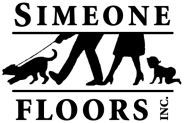FAQs
Simeone Floors Inc
Have a LVT, vinyl, carpet, or tile flooring-related question? Simeone Floors Inc has the answer. Check out these FAQs and give us a call today for more information!
-
What is resilient flooring?
Resilient flooring is made from materials such as vinyl, rubber, cork, or linoleum. It’s referred to as “resilient” because it has some give and flexibility, which makes it both highly durable and comfortable to walk on.
-
What are the benefits of resilient flooring in commercial settings?
Resilient flooring is ideal for commercial spaces because it’s durable, easy to maintain, and water-resistant. It also comes in a variety of styles and colors, making it a great option regardless of your preferred aesthetic.
-
How long does resilient flooring typically last in a commercial setting?
The lifespan of resilient flooring can vary depending on several factors. The quality of the material, the level of foot traffic, and the type of maintenance all contribute to the lasting power in a commercial setting. With proper care and maintenance, commercial-grade resilient flooring typically lasts between 10 and 20 years.
-
Can resilient flooring be installed over existing flooring?
Most of the time, yes. Resilient flooring can typically be installed directly over your existing flooring, provided the surface is clean, flat, and in good condition. It’s best to consult with the professionals at Simeone Floors first, however, to ensure the existing flooring is suitable.
-
How often do I maintain resilient flooring in a commercial space?
Routine maintenance is important when it comes to preserving the appearance and longevity of your commercial resilient flooring. We recommend daily sweeping or vacuuming, periodic mopping with a neutral pH cleaner, and clearing any spills or stains as soon as possible to prevent damage.
-
Is resilient flooring suitable for high-traffic areas?
Because of its durability and resistance to wear and tear, resilient flooring is a great choice for high-traffic areas in commercial settings. We recommend selecting the appropriate type and quality of resilient flooring based on your business’ specific needs.
-
Can resilient flooring be repaired if damaged?
Typically, yes, it can be repaired. Minor damage like scratches or gouges can often be repaired using techniques such as patching or filling. More extensive damage, however, may require replacing individual tiles or sections of the flooring.
-
Is resilient flooring environmentally friendly?
It can be depending on the specific material used. Some resilient flooring options such as linoleum and cork are more environmentally friendly due to their natural composition and renewable sources. Many manufacturers offer recycled content and eco-friendly production processes for their resilient flooring products.
-
How much does resilient flooring installation cost?
The cost depends on a variety of factors such as:
- Type of material
- Size of the space
- Subfloor condition
- Labor costs
For an accurate estimate, please contact the Simeone Floors team today.
Service Area
New England Region
New York
and surrounding areas

Share On: